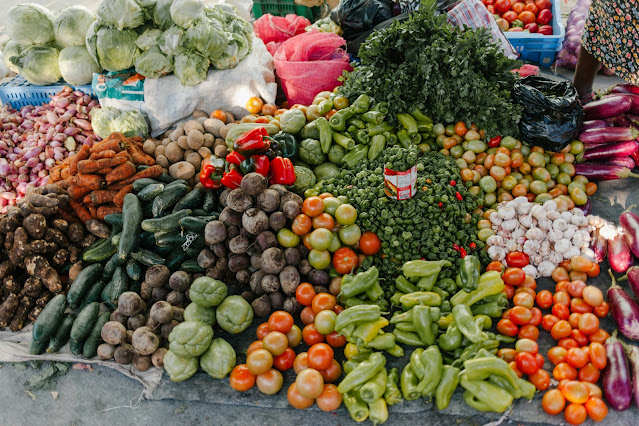I. Introduction
A. The Rise in the Popularity of Plant-Based Foods
Once considered a fringe movement, embracing plant-based foods has now become something of a trend, zooming into mainstream food scenes over the past decade like a sous-chef in overdrive. Yep, we're decidedly past the era where veggie diets were relegated to the nether corners of society. Today, people from all walks of life are giving plant-based foods a second look. And it's not just because of the tantalizing array of faux meats and dairy-free desserts. It’s also about the environmental and health impacts that are driving this uptick in popularity.
B. Understanding the Concept of Plant-Based Foods
“Plant-based” isn’t just a nifty hashtag; it's a whole new way to think about what's on your plate. No, not just lettuce and tomatoes - and certainly not dull, joyless meals. We’re talking about foods that come from plants, without animal ingredients such as meat, dairy, and eggs. Full of vibrant colors, diverse flavors, and lots of nutrients, these foods include everything from fruits, veggies and grains, to legumes, nuts and seeds.
C. The Relevance and Impact of Transitioning to a Plant-Based Diet
Transitioning to a plant-based diet isn't just about ticking off the 'vegan' box or getting a kick from experimenting in the kitchen (though, let’s face it, making chickpea “tuna” is kinda cool). It's a profound lifestyle shift with both personal and planetary effects. Subset of a sustainable lifestyle, it can benefit our health, lower the risk of diseases, and reduce our environmental footprint.
II. Insights into the Global Market for Plant-Based Foods
A. Overview of the Global Market for Plant-Based Foods
Every now and then, something comes along that turns the food industry on its head, and plant-based food is doing just that right now. It went from occupying a tiny crevice in the supermarket aisle to being a billion-dollar industry! This dynamic market meshes culinary creativity with scientific innovation, churning out products that make ditching our beloved burgers less of a sacrifice and more of an adventure.
B. Leading Countries in the Consumption of Plant-Based Foods
When it comes to guzzling the green stuff, countries around the globe are stepping up to the plate. With countries like the U.S., Canada, the UK and Australia leading the charge, there's a worldwide shift happening. But it’s not just these usual suspects making waves in the world of plant-based diets. Asian countries like China and India, with long-standing vegetarian traditions, are also growing markets.
C. Future Trends and Forecasts in the Plant-Based Food Market
Hold onto your plant-based hats because the future of this food trend is still taking shape. Current forecasts show a rise in environmentally friendly packaging, an onslaught of exciting new products, and an outpouring of investment in plant-based startups.
III. Health and Nutritional Aspects of Plant-Based Foods
A. Nutritional Value and Health Benefits of Common Plant-Based Foods
Ever heard a kid grumble about too many veggies on their plate? Little do they know, every plant-based food packs a powerhouse of nutrients. From broccoli loaded with cancer-fighting antioxidants to bananas brimming with mood-boosting serotonin, these foods have got your back and body.
B. Debunking Myths: Protein Sources and Deficiencies in a Plant-Based Diet
“Where do you get your protein from?” - the rallying cry of plant-based diet sceptics. Yes, we've all heard it. But guess what? The plant kingdom is brimming with protein-packed gifts. From lentils and quinoa to tofu and tempeh, these plant-based foods hold their own in the protein department. And deficiencies? With a well-planned, diverse diet, they are about as likely as bumping into a unicorn in your backyard.
C. The Role of Plant-Based Foods in Chronic Disease Prevention and Management
While we can’t expect a plant-based diet to be like some miracle health elixir, it does have some impressive skills. Studies show it can play a significant role in warding off chronic diseases like heart disease, diabetes, and certain cancers. Plant power, indeed!
IV. Environmental Implications of Shifting to Plant-Based Foods
A. The Environmental Footprint of Plant-Based Versus Animal-Based Foods
Let's play a game of Spot the Difference. On one hand, we have animal agriculture contributing significantly to greenhouse gas emissions, deforestation, and water pollution. On the other, we have plant-based agriculture, which typically uses less water and less land, and releases fewer emissions. Which would you choose?
2 . Hidden survival food farm for preppers - works like gangbusters!
B. Plant-Based Foods and Sustainability: The Connection
Our planet is heaving a sigh of relief as more people choose plant-based foods. Why? Cultivating these foods is generally less resource-intensive. Plus, it potentially reduces the pressure on our forests and frees up land for other uses—like creating habitats for animals or capturing carbon. Win-win, right?
C. The Impact of Plant-Based Foods on Biodiversity and Climate Change
Every plant-based meal, or “meatless Monday”, is a step toward slowing climate change and protecting biodiversity. Utilizing various plant species for food promotes agricultural diversity, which leads to healthier ecosystems. And with lesser demand for animal agriculture, there’s less deforestation, promoting biological diversity. That’s the power of the (plant) force.
V. Challenges and Opportunities in the Plant-Based Food Industry
A. Controversies and Challenges in the Plant-Based Food Industry
Despite the green rush, plant-based food isn’t without its pragmatics. Issues like over-reliance on processed alternatives, sustainability concerns about certain plant crops, and high prices are the bumps in this green road. And let’s not forget the social challenges, from “Is it really vegan?" debates to the struggle to find decent plant-based options at social events.
Abdomax: The perfect solution for anyone looking to help support gut health and digestion!
B. Opportunities for Innovation in the Plant-Based Food Industry
By golly, the plant-based realm is a culinary playground waiting to be explored! Chefs, food scientists, and innovators are crafting everything from plant-based cheeses that could fool a Parisian, to burgers that bleed beet juice. There’s an opportunity for everyone - from allergy-friendly to culturally diverse foods.
C. Strategies for Promoting and Incorporating More Plant-Based Foods in Our Diets
Getting more plant-based foods into our diets might seem like a steep hill to climb, but it doesn’t have to be. Start with a positive mindset, explore new foods, get creative in the kitchen and be patient with yourself. Going veggie doesn’t have to be all or nothing - even small substitutions make a difference.
VI. Conclusion
A. Key Takeaways on the World of Plant-Based Foods
Plant-based food is becoming a sensational juggernaut, touching all corners of our diets. It's a world full of innovation and promise, squashing misconceptions, and showing us how gastronomically interesting and diverse plants can really be.
B. The Intersection of Health, Sustainability, and Food Choices
When it comes to health and sustainability, plant-based foods sit right at this crucial intersection. It’s simple: when we choose these foods, we're choosing our health, the planet’s health, and a food industry that aligns with these values.
C. Future Perspectives: How Will the Story of Plant-Based Foods Unfold?
Who knows what the future holds for this green revolution? However it unfolds, it's clear that the plant-based narrative is as ripe and lush as a thriving veggie garden. It’s a narrative where our dinner plates might just save the world.
VII. Frequently Asked Questions (FAQs)
A. What Exactly is a Plant-Based Diet?
A plant-based diet circles around foods derived from plants, including vegetables, grains, legumes, nuts, and seeds, with limited or no animal products. How about an easy analogy? Picture a garden flourishing with different kinds of plants—that’s a rough version of your plate on a plant-based diet.
B. Are Plant-Based Diets Nutritionally Adequate?
Just because McDonald’s isn’t on your speed dial anymore, doesn't mean you’re headed for malnutrition city. A well-balanced, varied plant-based diet can provide all the necessary nutrients your body needs. And with the zillion plant-based substitutes available today - it's never been easier!
C. What Are the Environmental Benefits of Eating Plant-Based Foods?
Eating your greens isn’t just good for you, it’s good for our planet too. Plant-based diets generally have a lower environmental footprint, preserving land, water, and biodiversity, while also reducing greenhouse gas emissions compared to a heavy meat-based diet.
D. What Are the Current Trends and Future Perspectives in the Plant-Based Food Market?
With plant-based, the buzzword is 'innovation'. New recipes, substitutes, convenience foods—the plant-based market is bursting with potential. As for future perspectives, it's all about fine-tuning: more authentic tastes, improved textures, and lower prices are all on the horizon.
E. What are some common challenges faced by the plant-based food industry and possible solutions?
Some challenges for the plant-based food industry include higher pricing, varying taste preferences, and a lack of awareness about plant-based diets. But, as awareness grows and technology innovates, we shall see more affordable, tasty, and widely available plant-based options.





.jpg)